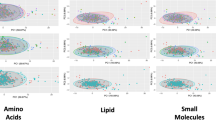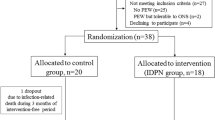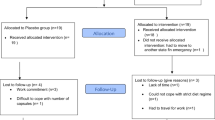Abstract
Glutamine supplementation improves insulin sensitivity in critically ill patients, and prevents obesity in animals fed a high-fat diet. We hypothesized that glutamine supplementation favors weight loss in humans. Obese and overweight female patients (n=6) were enrolled in a pilot, cross-over study. After recording anthropometric (that is, body weight, waist circumference) and metabolic (that is, glycemia, insulinemia, homeostatic model of insulin resistance (HOMA-IR)) characteristics, patients were randomly assigned to 4-week supplementation with glutamine or isonitrogenous protein supplement (0.5 g/KgBW/day). During supplementation, patients did not change their dietary habits nor lifestyle. At the end, anthropometric and metabolic features were assessed, and after 2 weeks of washout, patients were switched to the other supplement for 4 weeks. Body weight and waist circumference significantly declined only after glutamine supplementation (85.0±10.4 Kg vs 82.2±10.1 Kg, and 102.7±2.0 cm vs 98.9±2.9 cm, respectively; P=0.01). Insulinemia and HOMA-IR declined by 20% after glutamine, but not significantly so. This pilot study shows that glutamine is safe and effective in favoring weight loss and possibly enhancing glucose metabolism.
This is a preview of subscription content, access via your institution
Access options
Subscribe to this journal
Receive 12 print issues and online access
$259.00 per year
only $21.58 per issue
Buy this article
- Purchase on Springer Link
- Instant access to full article PDF
Prices may be subject to local taxes which are calculated during checkout
Similar content being viewed by others
References
Stevens GA, Singh GM, Lu Y, Danaei G, Lin JK, Finucane MM et al.. National, regional, and global trends in adult overweight and obesity prevalences. Popul Health Metr 2012; 10: 22.
Berthoud HR . The neurobiology of food intake in an obesogenic environment. Proc Nutr Soc 2012; 71: 478–487.
Bo S, Ciccone G, Durazzo M, Ghinamo L, Villois P, Canil S et al.. Contributors to the obesity and hyperglycemia epidemics. A prospective study in a population-based cohort. Int J Obes (Lond) 2011; 35: 1442–1449.
Curi R, Lagranha CJ, Doi SQ, Sellitti DF, Procopio J, Pithon-Curi TC et al.. Molecular mechanisms of glutamine action. J Cell Physiol 2005; 204: 392–401.
Grau T, Bonet A, Minambres E, Pineiro L, Irles JA, Robles A et al.. The effect of L-alanyl-L-glutamine dipeptide supplemented total parenteral nutrition on infectious morbidity and insulin sensitivity in critically ill patients. Crit Care Med 2011; 39: 1263–1268.
Opara EC, Petro A, Tevrizian A, Feinglos MN, Surwit RS . L-glutamine supplementation of a high fat diet reduces body weight and attenuates hyperglycemia and hyperinsulinemia in C57BL/6J mice. J Nutr 1996; 126: 273–279.
Prada PO, Hirabara SM, de Souza CT, Schenka AA, Zecchin HG, Vassallo J et al.. L-glutamine supplementation induces insulin resistance in adipose tissue and improves insulin signalling in liver and muscle of rats with diet-induced obesity. Diabetologia 2007; 50: 1949–1959.
Greenfield JR, Farooqi IS, Keogh JM, Henning E, Habib AM, Blackwood A et al.. Oral glutamine increases circulating glucagon-like peptide 1, glucagon, and insulin concentrations in lean, obese, and type 2 diabetic subjects. Am J Clin Nutr 2009; 89: 106–113.
Samocha-Bonet D, Wong O, Synnott E-L, Piyaratna N, Douglas A, Gribble FM et al.. Glutamine reduces postprandial glycemia and augments the glucagon-like peptide 1 response in type 2 diabetes patients. J Nutr 2011; 141: 1233–1238.
Oudemans-van Stratten HM, Bosman RJ, Treskes M, van der Spoel HJ, Zandstra DF . Plasma glutamine depletion and patient outcome in acute ICU admissions. Intensive Care Med 2001; 27: 84–90.
Acknowledgements
Products were generously provided by Nutricia, which was not involved in the design of the study, nor in the analysis of the results.
Author information
Authors and Affiliations
Corresponding author
Ethics declarations
Competing interests
Dr Rossi Fanelli has received research funds and compensation for consultation from Fresenius Kabi. Dr Laviano has received compensation for consultation from Abbott, Baxter, Danone Research, Fresenius Kabi. The remaining authors declare no conflict of interest.
Rights and permissions
About this article
Cite this article
Laviano, A., Molfino, A., Lacaria, M. et al. Glutamine supplementation favors weight loss in nondieting obese female patients. A pilot study. Eur J Clin Nutr 68, 1264–1266 (2014). https://doi.org/10.1038/ejcn.2014.184
Received:
Revised:
Accepted:
Published:
Issue Date:
DOI: https://doi.org/10.1038/ejcn.2014.184
This article is cited by
-
Effect of glutamine supplementation on cardiometabolic risk factors and inflammatory markers: a systematic review and meta-analysis
BMC Cardiovascular Disorders (2021)



